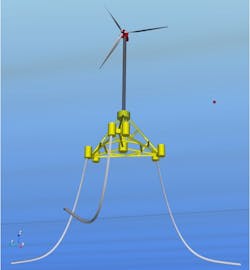Digital tool models behavior of floating wind turbines
As demand for clean energy grows, the offshore floating wind market is set for significant expansion.
The pipeline of projects in the floating market is huge, with around 20 GW of production set to be installed by 2030, and opportunities emerging in locations across Europe, the West Coast of the USA, and in Asia. Furthermore, it has been estimated that 80% of all potential offshore wind resources are in water depths of more than 60 m (197 ft) – a key advantage for floating technologies. However, to withstand harsh environmental conditions farther out at sea, all components of floating assets must be properly designed and certified.
Bureau Veritas has introduced Opera, a new digital simulation tool, to support certification of floating units, notably floating wind turbines. The technology has been developed in partnership with clients over a 10-year program of R&D and engineering. Opera offers an independent modeling solution that can be used to evaluate and verify the wind turbine’s behavior at sea and loads under environmental conditions (wind, waves, current) and the interaction with mooring lines and dynamic power cables.
It can be used to analyze the integrity of sea-keeping and station-keeping assessments of any floating structure subject to sea loads, including wind turbines powered by wind loads. It also addresses the complex physics involved with aero-hydro couplings and the multi-body interactions inherent in floating projects.
A key role for the software is the evaluation and verification of unit designs to ensure they are fit for purpose and comply with requirements. Opera can perform a range of functions such as integrated loads analysis, taking into account all types of couplings, non-linear sea loads, drag and lift co-efficients and blade element momentum theory for aerodynamic loads, to provide a comprehensive analysis for any floating wind project.
The tool can be adapted to the needs of clients working on innovative floating projects and designs, or to test calculations, analyses, and assumptions made by floating unit designers using alternative software. Avoiding the need to engage a commercial software supplier reduces project costs and eliminates the risk of sharing IP or commercially sensitive information with third parties. In summary, Opera helps project developers, designers, and operators ensure projects are de-risked as much as possible while helping the offshore industry transition to lower-carbon operations.
